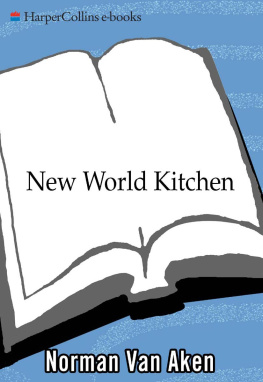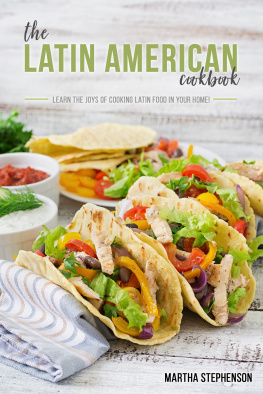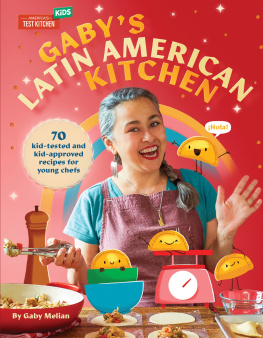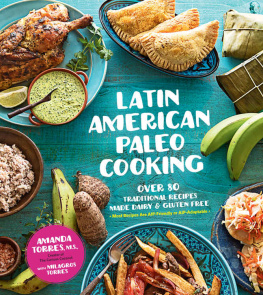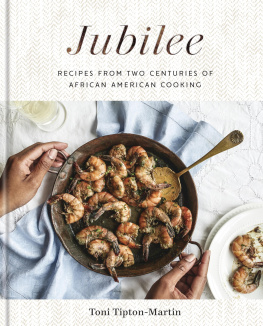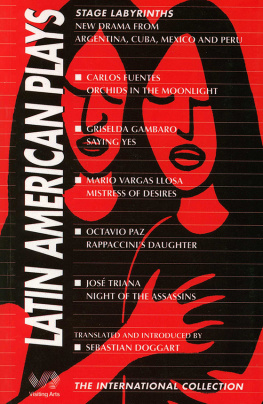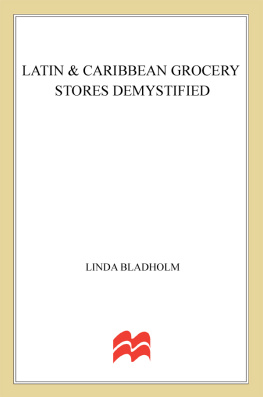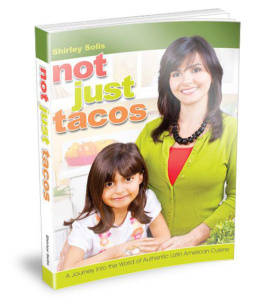This book is dedicated to Mama.
the beauty of this amazing journey.
First and always, this book wouldnt have been possible without the love and support and hard work of my wife, Janet. Truly this book is as much hers as mine. Fortunately for me, she is mine also.
My gratitude goes to our son, Justin, who was born here in Florida and has more to do with his fathers lifes work than any other man, in that I want him to be happy knowing that work can be a form of love.
Id also like to thank the people of Florida, my adopted state, for sharing its rich diversity of cultures, foods, traditions, and natural beauty.
My deep thanks go to my partner in our restaurant, Carl Brugge-meier, for giving so generously of his strength, his expertise, and his energy, keeping our restaurant on the straight and narrow as I put this book together. Of course, I want to thank Carls wife, Debi, for her patience and good humor.
I also want to acknowledge and express my appreciation to the entire team at NORMANS. Some have gone on to other things, and many have remained to help fulfill our vision. Special thanks to my assistant, Anna Elena Pedron; our chefs, Craig Petrella, Arthur Artiles, and Frank Ferreiro; pastry chef Todd Mueller; and Fan Fan Noel. Id like to thank the wine experts Rodrigo Martinez and Proal Perry.
Thanks to our recipe testers Paola Gaitan and Lisa Neuwirth. Thanks also to my Latin and Caribbean friends who helped keep a Midwestern-born chefs Spanish and New World food history on the up-and-up. They include Viviana Carballo, Omar Prunera, Gianna Bergonzini-Pedron, and Libardo Salazar.
The vision and support of the esteemed Daniel Halpern at Ecco was fundamental in making this book, as he was the first to see that it was time to give birth to this endeavor. Thanks to Mitchell Kaplan, who brought Dan to dinner at my restaurant in the very beginning, and who always brings me great authors to feed. To my editor, Lisa Chase, whose attention to detail and passion for excellence make for fine company in any project seeking truth and clarity. To Tim Turner, who is the worlds finest food photographer and one hell of a man to ask to illuminate your dreams.
One of my primary mentors in writing this book was Mr. Luis Zalamea, whose historical and cultural input were crucial. He is a gentleman of the old school, and that is something we need in an era that reveres speed more than beauty. Technically, he hails from Colombia, but really he is a man of the world. Though we are longtime friends, I simply cannot call him Luis. He might prefer it, but for me he is Mr. Z. I attach the formality out of humility. Hes helped me immeasurably, and his words and mine form at times a type of palimpsest. Id have been lost without him in many of these places.
Ive included a bibliography of books that have inspired me, but I specifically would like to thank several of the founding visionaries in the melding of Latin and Caribbean cooking who were so instrumental in my education. Among them are Elisabeth Lambert Ortiz, Betty Fussell, Douglas Rodriguez, Stephan Pyles, Dean Fearing, John Sedlar, Mark Miller, Robert Del Grande, Anne Lindsay Greer, Diana Kennedy, Rick Bayless, Jean Andrews, Maricel Presilla, Jessica Harris, and Raymond Sokolov.
Id like to thank my brother Charlie Trotter for his unwavering friendship.
Id also like to thank some of the giants of our extended restaurant family, whove been very kind to us over the years: Daniel Boulud, Emeril Lagasse, Nobu Matsuhisa, Jim Clendenen, Tony Soter, Alice Waters, Tetsuya Wakuda, Wolfgang Puck, Lulu Peyraud, Mireille Guiliano, Ruth Reichl, Caroline Stuart, Michael and Ariane Batterberry, Barbara Kafka, and Johnny and Betsey Apple.
Several professional organizations and publications have been a mainstay in supporting my work over the years. To mention all of them would be impossible, but in particular Id like to thank the James Beard Foundation, the American Institute of Wine and Food, and the International Association of Culinary Professionals.
Id also like to thank the people in our industry whove helped me with finding the sources for ingredients from around the world. Their contributions and names appear in the Source Guide.
Dear family and friends who help us remember that while we are cooks who must perform, we are people too who need to chill, include Pam and Steve, Proal and Connie, Brian and Gina, the entire Amsler family, Russ Alba, Daniel Gill, Steve Greystone, and my sisters, Bet and Jane, and my brother, Buddy.
Finally, in memoriam: Raji Jallepalli, Jean-Louis Palladin, Barbara Tropp, and Jamie Shannon. Sometimes the lights go out early, but through love like theirs, we still can see.
You probably know Norman Van Aken as the James Beard Awardwinning chef of NORMANS in Coral Gables, Florida, the founding father of the legendary Mango Gang of Southeastern chefs, and one of the originators of such trendsoften mentioned in conjunction with his nameas fusion, Pan-Latino, Nuevo Latino, and Floridian cuisines. The general consensus is that hes the Big Dog when youre talking about that part of the countrythat he has made a whole swath of territory, an entire spectrum of flavors and ingredients, his own. If you are lucky enough to have eaten in his restaurant, you know how good he is.
Like all too few great American chefs who can trace their roots back to the frontier days of new American cookingthe wild seventies and eightiesNorman Van Aken came up the old-school way, the hard way: learning on the ground and in the trenches. He learned not just the intricacies, strategies, and challenges of the professional kitchen and dining room but what makes food work. Starting with his humble beginnings as a teenage busboy and dishwasher, and continuing through years of bouncing around from restaurant to restaurant as a cook, sous-chef, and chef, he saw and learned not only which dishes were likely to succeed and be popular but what about them would please and excite people. This is valuable information. The knowledge and ability that distinguishes great from ordinary chefs is a close familiarity with the roots of pleasure, the quantification of the cooks strange and terrible power to titillate, tease, inspire, seduce, satisfy, and nourish. This is wisdom missed by many of Normans school-taught, classically trained contemporaries, for whom this is how to make a demi-glace is all too often accompanied by you cannot do this and this is not done. While much of the Western cooking world petrifies in the smothering grip of the old European masters, Norman Van Aken remains, while a respected elder statesman of American cuisine, something of an outlaw.
It is only appropriate that Norman has succeeded so famously in fusing ingredients generally associated with other countries and other cultures. He is generally credited with having coined the term fusion to describe this type of cuisine, and at NORMANS, he continues to combine creativelyeven fiendishlyelements of the Old World and the new in ways that are dazzling and that, when admired up close, smelled, tasted, and savored, make perfect sense.
Im a New Yorker, largely unfamiliar with the foodways of South America and the Caribbean, a dinosaur Francophile, deeply and instinctively suspicious of strange, new-sounding ingredients. On my first visit to NORMANS, his eponymous restaurant, I was frankly intimidated by the exotic-sounding juices, spices, and tubers, many of them foodstuffs that wouldnt likely pop up on my own Eurocentric prep list. I should not have been concerned. Unlike so many practitioners of fusion, Norman Van Aken, rather than creating tiny, gorgeous yet sterile monuments to his own brilliance, regularly creates dishes that speak to the soul. As you will learn in these pages, few of his ingredients are new or foreign at all, but vital parts of cultures and traditions that have been with us all along. His cooking, like his writing, reveals that most rare and wonderful attribute in a chef: a deep, heartfelt knowledge and understanding of human nature and cultural history, of the shared need to be nourished.

